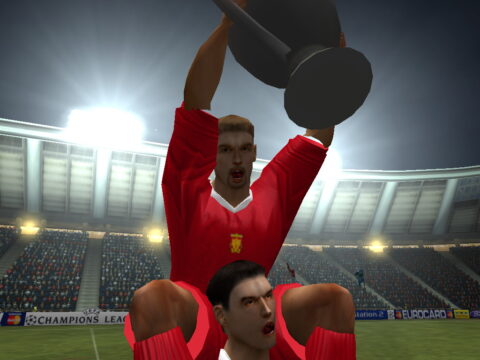
UEFA Champions League: Season 2001/2002
Written by: Rik
Date posted: October 26, 2019
- Genre: Sport
- Developed by: Silicon Dreams
- Published by: Take 2 Interactive
- Year released: 2002
- Our score: 5
The early 00s were desperate times for the PC football game fan. Until Pro Evolution Soccer 3 arrived in 2003, it was either FIFA (at that point at a particularly low ebb in terms of quality) or one of a handful of uninspiring alternatives, among which Silicon Dreams’ UEFA Champions League series was to be found. After making their football game debut with the largely-ignored Olympic Soccer, the developer achieved moderate success with the World League Soccer games, which were notable in my mind for heavily exaggerating the physical differences between players to unintentionally comic effect, and a celebrity endorsement from the teenage Michael Owen (who was paraded around at Eidos promotional events alongside model Nell McAndrew, at that time fulfilling ‘real-life’ Lara Croft duties).
World League Soccer was considered one of the better late-90s PC efforts, behind league leaders FIFA and Actua Soccer, and with the acquisition of the Champions League license, a handful of other games followed, again occupying third or fourth place at best, without ever challenging for the top spot. Season 2001/2002 is the last of Silicon Dreams’ football efforts and, no surprises, it’s a massive improvement upon the dreadful Champions League tie-in we covered previously, while – like many of the football games we cover here – also fitting into the ‘still not that good, really’ category.
The history is hopefully of interest to some though, particularly if, like your correspondent, you happen to hold fond memories of a healthy football game marketplace which, as previously noted, is a far cry from the modern FIFA vs. Pro Evo shootout. In addition, this particular game’s steadfast refusal to refrain from crashing, except under very specific circumstances, added an extra frisson to proceedings, with the extra effort expended only hardening my resolve to continue and produce a meaningful write-up. (As I never *quite* got to the bottom of the problem, to the extent that I would be able to offer meaningful and useful assistance to others, and we are more than 15 years after the date of release, it’s not really fair to speculate on the stability of the game upon release, or factor it into our thoughts here, but brief ramblings on my experiences can be found above).
So – the game! It opens, of course, with the famous music that resembles (but is legally distinct from) Handel, while also tricking you into thinking that the lyrics are vaguely operatic when in reality it’s just the words ‘The Champions/The Champions League’ repeated over and over again [are you sure about this? – FFG reader]. Happily, the video also features footage of Fernando Redondo making an arse of Henning Berg during a famous Real Madrid victory at Old Trafford, which is nice (unless, of course, you support Manchester United, in which case your feelings are of no concern to me, or any right-thinking human).
Further tie-in trimmings include the talents of the then ITV commentary team of Gabby Logan, Guy Mowbray and Barry Venison, and the relevant corporate sponsors also appear on advertising hoardings. Plus, if you make progress in the tournament itself, you’re also treated to blurry video footage from the relevant stages of the 2001 competition, which meant I was able to enjoy replays of Leeds United being outclassed by Valencia in the semi-finals (which represented their last meaningful participation in European competition, the pursuit of which fuelled the ruinous spending that ironically reached its nadir during the season represented in this game and precipitated a dramatic drop into the third tier of league football).
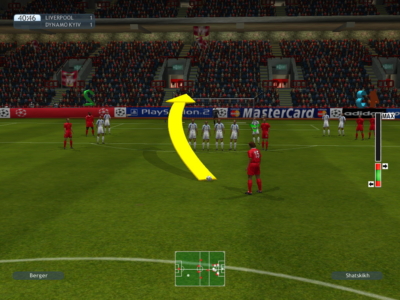
As with all ‘giant arrow’ systems, said arrow is next to useless when it comes to judging where your kick will actually end up.
On the pitch, the action is a long way from the comical dross of the first ever tie-in, while being also some distance from the top games of the time and indeed the high class football promised by the tournament itself. It’s a clumsy affair, being afflicted by the same issues as many similar games of the era: imprecise passing, clumsy tackling, and dribbling that falls some way short of nimble. Animations are slightly disjointed and unintentionally amusing at times, with the ‘player leans forward while out of breath’ one reoccurring altogether too frequently – most incongruously in the immediate aftermath of a successful attempt on goal, before the same players are shown jumping around and celebrating only seconds later. Running with the ball at pace is tricky and made only slightly better by use of a fancy ‘skill-move’ button, but unless there are acres of space ahead then losing possession is more than likely. Equally, finding space to shoot in the box is harder than you might like, although perhaps this is balanced against the fact that the shots you do get away have quite a high chance of success.
Playing this immediately after distant predecessor Olympic Soccer, one thought that springs to mind is the fact that superhuman goalkeepers were often used to mask other flaws in old football games, with cunning being required to find weaknesses specific to a particular title, while often what would in real football be considered clear goalscoring chances would be easily thwarted. Here, generally if you are presented with a good chance, it will go in, with goalkeepers being more on the stupid side if anything, and their ‘surprised by a shot’ animation (they go down as if shot by a tranquiliser dart) is another that plays far too often, including when saving a long-range effort that they’ve seen all the way.
Despite all of that, and sundry other quirks and annoyances (players unexpectedly resorting to overhead kicks at inopportune moments; golf-game-style free kicks), UEFA Champions League Season 2001/2002 does still feel at times like an accurate representation of the real-life tournament. The slightly distant atmosphere of inconsequential group games is present and correct, and when unfancied opposition score with their only shot against the run of play in such matches, it does feel very on-brand.
Although missing the talents of main ITV commentator Clive Tyldesley, the voice-over combo is otherwise authentic and effective, with the single tournament focus and limited number of teams allowing for a bit more detail in some of the comments, and there are some nice touches, for example when you hammer the button to get on with the game during half-time and instead of just cutting the (admittedly generic and repetitive) spiel short, commentator Mowbray apologises to Logan for the interruption and earlier than anticipated restart.
Of the three members of the voice cast, ex-Newcastle and Liverpool defender Barry Venison perhaps is the least convincing, although I can neither remember what made him an appealing choice as a real-life summariser in the first place, nor how he ultimately ended up drifting out of contention. As such, his utterances here may well be genuinely representative of his punditry, but there is a vaguely pantomime element to some of his statements, with an almost puritanical commitment to hard tackling a recurring theme. (“Tackling is an art, and it’s going out of our game,” he says at least once per match, in the manner of a Daily Mail article romanticising a fictional past in which kids were always polite and no-one needed to lock their front doors. It’s funny because the tackling here is anything but artful, a combination of frequently mistimed foot-in attempts and robust slides).
Looks wise, it’s reasonable enough for the time: stadia are detailed, the grass stands proud of the pitch, nets bulge nicely and kits (mostly) feature sponsors, but players are largely lacking in distinguishing features. Still, in terms of recreating the feeling of the real-life 2001/2002 tournament in video game form, this is a reasonably effective effort. There are a few spots where things could be better – there’s no performance tracking (goals, assists etc.) across the tournament, while player stats and starting lineups aren’t quite as you’d expect, and the so-called ‘auto manage’ feature also fiddles with starting line ups and makes substitutions on your behalf if you forget to turn it off. Also, your reward for finishing as champions is the very briefest of cut-scenes, which seems a bit harsh, although it could be that the very specific circumstances of getting the game to work in order to achieve my own victory created expectations of reward that were disproportionate.
The lowest difficulty setting presents a low-level challenge and is capable of besting you, particularly while you try to get to grips with the control system, but once that time passes, it’s eminently beatable. A switch to intermediate (2 of 3) makes the general clumsiness of proceedings more of an irritant as you’re forced to battle the game’s idiosyncrasies a little more to achieve victory, and the opposition become more ruthless in terms of scoring with virtually every attempt on target. It was challenging enough to satisfy my own curiosity and I felt no need to crank it up any higher.
As we mentioned in coverage of a more recent but flawed footy title, having official logos and music plastered all over everything shouldn’t make as much of a difference as it does, but there’s no denying that an average game with lumpy gameplay can be elevated by such frippery, and so it is here. Contemporary coverage of the console version generously posited that it didn’t suffer too badly in comparison to the likes of Pro Evolution Soccer. In my view, it’s absolutely miles away from PES, although on the PC, it would have been more in line with the relatively low standards of the day, and despite undeniable clunkiness (not to mention the ridiculous issues getting it to work in the first place), some of the magic of watching early 00s Champions League matches on ITV does remain.

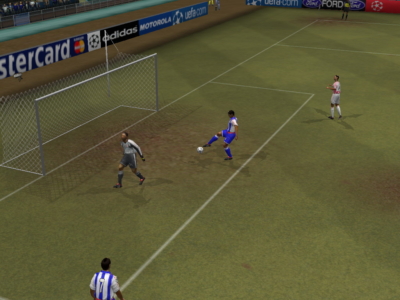
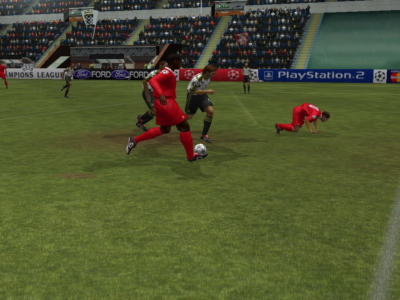
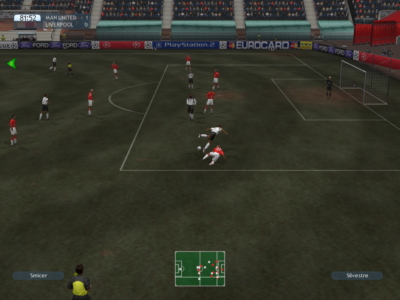

 Posts
Posts